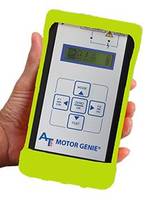Motor Genie® Trouble Shooting Tool detects winding faults.
Press Release Summary:

Motor Genie® Trouble Shooting Tool is used testing low voltage AC induction motors. Unit measures impedance, phase angle, current/frequency, insulation to ground resistance. Product detects winding faults such as turn to turn coil and coil to coil along with grounded windings.
Original Press Release:
ALL-TEST Pro Releases New Product- Motor Genie®
The MOTOR GENIE® can see more than a Me -Ohm-Meter, Resistance or RCL Tester
The perfect tool for trouble shooting, start-up & quality control of low voltage AC Induction Motors.
The hand-held MOTOR GENIE® is an excellent trouble-shooting tool that will test low voltage AC Induction motors. The MOTOR GENIE® will find winding faults such as turn to turn and coil to coil, along with grounded windings.
The MOTOR GENIE® will measure impedance (Z), phase angle (Fi), current/frequency response (l/f), insulation to ground resistcmce (500V or 1000V and measure to 500 meg-ohm).
MOTOR GENIE® testing range is dependent upon the motor, but the MOTOR GENIE® has successfully tested AC motors of hundreds of horsepower in size
MOTOR GENIE® Measurement Technology
EPRI Statistics
Based on statistical data compiled by the Electric Power Research Institute (EPRI), 47% of motor failures are due to electrical faults/failures. The 47% can be further broken down into rotor problems (10%) and winding problems (37%). Mechanical faults may sometimes have root causes that are electrical in nature.
Winding defects can occur due to insulation age, contamination, power surges, thermal overload, damaged wire/materials, vibration and other causes. The begin as energy crossing an insulation fault (such as moisture or contamination), which isolates at least one turn. This generates additional stress and heat across the defect, which progresses until an arc is drawn and the winding fails.
About Winding Faults
There are four basic types of winding faults.
- Between turns in a coil
- Between coils in a phase
- Between coils in different phases
- Between a coil or phase and ground
Only about 5% of electrical faults begin as a fault to ground. The other three fault types may or may not propagate into a ground fault as the failure becomes advanced. The short term result of these faults is reduced efficiency (and higher operating costs). Symptoms include higher operating temperatures, perhaps nuisance tripping, and reduced motor life. As faults advance, power and torque may decrease. The longer-term result is always motor failure.
Testing Options
Megohm Insulation testing will only detect faults to ground. Since only 5% of motor faults begin as ground faults, the majority of faults will go undetected using this method alone.
Surge testing requires the application of high voltages and currents, and can be a destructive test, actually generating faults. This aspect, combined with the size of surge testing equipment makes it inappropriate for troubleshooting and predictive maintenance testing.
Resistance and inductance-only (RLC) test methods don't provide enough information for reliable fault detection and troubleshooting.
ALL-TEST PRO® MOTOR GENIE® is your best, most economical choice, for fault detection and troubleshooting.
About ALL-TEST Pro, LLC
ALL-TEST Pro, LLC (ATP) manufactures handheld, portable instruments for the testing of electric motors, generators, transformers and other coil-based devices. ATP's De-Energized testing (Motor Circuit Analysis-MCA™), Energized testing (Electrical Signature Analysis-ESA) and Power Quality Analysis instruments provide predictive maintenance testing, quality control and troubleshooting for a low initial investment and rapid ROI.




